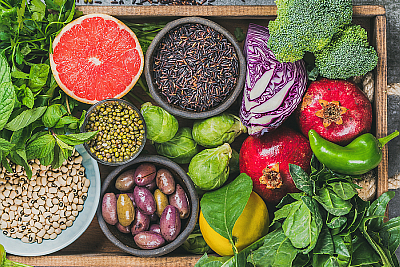The topic of maintaining a healthy immune system has been on all our minds lately. We want to do everything possible to fend off illness and stay healthy.
Even in normal times, many of us think about strengthening our defenses against the common cold, flu, and other “bugs”—especially as the weather changes. It’s a big job, one that largely falls to the body’s immune system.

Penny Kris-Etherton, PhD, RDN
“Most people don’t think about their immunity until they get sick. Now we know how important it is to have a strong immune system,” says Penny Kris-Etherton, PhD, RDN, Immediate Past Chair of the Lifestyle Council for the American Heart Association and Evan Pugh University Professor of Nutritional Sciences at the Pennsylvania State University.
Dr. Kris-Etherton studies the role of nutrition in preventing disease, is a past member of the American Heart Association’s Nutrition Committee, and has been a member of the USDA’s Dietary Guidelines Advisory Committee—the group of experts that reviews the latest nutrition science to help guide recommendations for what we should eat and drink to promote health and prevent disease (a.k.a., the Dietary Guidelines for Americans).
We sought her advice to help all of us better understand how the immune system works, and what you can do to keep yours in tip-top shape.
How Your Immune System Works
Put simply, your immune system is your body’s natural defense against things that could make you sick. It is made up of various organs, cells, and proteins. We are born with some level of immunity (called innate immunity), and our bodies learn the rest over time (adaptive or acquired immunity). When you encounter something like a bacteria or virus, your immune system springs into action recognizing the harmful invaders, producing antibodies to target them, and helping you heal should you get sick.
 Typically, you get sick from germs your body has never encountered before, since your immune system hasn’t yet learned to recognize the new threat. However, seasonal cold and flu viruses are constantly changing, and it’s up to your immune system to keep up. A strong immune system can help prevent you from getting sick if it already recognizes the bug. It can also help fight off illness more quickly and with less down time if you do get sick.
Typically, you get sick from germs your body has never encountered before, since your immune system hasn’t yet learned to recognize the new threat. However, seasonal cold and flu viruses are constantly changing, and it’s up to your immune system to keep up. A strong immune system can help prevent you from getting sick if it already recognizes the bug. It can also help fight off illness more quickly and with less down time if you do get sick.
But if your immune system is weakened for any number of reasons, then your defenses just aren’t operating at their peak. It’s also important to note that our immune systems become less efficient as we age. “Because of this waning immunity, older people are more susceptible to getting sick,” shares Dr. Kris-Etherton. “They have to be even more cautious, even if they do all the right things to stay healthy.”
Your “Immunity Engine” Maintenance Plan
From head to toe, our bodies are complex—and the immune system is no different. Think about yours as an engine with multiple parts requiring a well-balanced maintenance plan to keep it running at its best.
Even if you are healthy and not fighting any serious disease, many things contribute to supporting your immunity engine. These include the usual suspects: a healthy diet, hydration, regular exercise, sleep, stress management, maintaining a healthy weight, moderating your alcohol consumption (if you do drink), and not smoking.
While we can’t always control the germs we encounter out in the world, the good news is we can control these lifestyle factors. No matter your age, embracing healthier habits can directly pay off for immune health.
8 Ways to Strengthen Your Immunity
So, what are all the right things? You know to wash your hands regularly and to keep sanitizer handy. But it turns out that good hygiene is just the beginning.
Dr. Kris-Etherton offers these eight tips to help keep your immunity engine humming along. Again, there is no single magic bullet here, but the combination can make a real difference in maintaining a healthy immune system.
1. Eat More Fruits and Veggies
 Making healthy choices—especially when it comes to food—can help build up your body’s ability to ward off infections. “We know good nutrition aligns with good immune health. There is so much you can do by taking charge of your lifestyle,” says Dr. Kris-Etherton. Fruits and vegetables contain critical, immune-supporting nutrients like vitamins A and C, iron, selenium and zinc. Dark green, red, yellow and orange vegetables are sources of vitamin A. Citrus fruits are sources of vitamin C. Spinach is a great source of iron. Cruciferous vegetables like broccoli, cauliflower and cabbage are sources of selenium. And mushrooms are a source of zinc. Aim to fill half your plate with a wide variety of vegetables and fruits—and change it up each day. The more colorful your diet, the better!
Making healthy choices—especially when it comes to food—can help build up your body’s ability to ward off infections. “We know good nutrition aligns with good immune health. There is so much you can do by taking charge of your lifestyle,” says Dr. Kris-Etherton. Fruits and vegetables contain critical, immune-supporting nutrients like vitamins A and C, iron, selenium and zinc. Dark green, red, yellow and orange vegetables are sources of vitamin A. Citrus fruits are sources of vitamin C. Spinach is a great source of iron. Cruciferous vegetables like broccoli, cauliflower and cabbage are sources of selenium. And mushrooms are a source of zinc. Aim to fill half your plate with a wide variety of vegetables and fruits—and change it up each day. The more colorful your diet, the better!
2. Power with Protein
Protein plays a role in helping your body heal and recover, which is the next best thing to prevention. You can get your protein from sources like lean meat, poultry, and eggs, but seafood is the real star here. “Seafood contains omega-3 fatty acids and vitamin D, both of which have beneficial effects on immune health,” Dr. Kris-Etherton advises. “Any seafood is good, but you especially want to try fish rich in healthy fats, like salmon, trout, and tuna.” Aim for two servings or more a week.
3. Choose Healthy Hydration
Staying hydrated helps our blood stream carry nutrients throughout our bodies. As Dr. Kris-Etherton puts it: “The body needs fluids to function and to keep things going.” Aim for 9 to 12 glasses of water each day. Unsweetened coffee, tea, and other low-calorie beverages are also good choices.
4. Don’t Rush to Supplement
Your body absorbs nutrients better when they come from food. That’s why Dr. Kris-Etherton recommends a real food first approach. “There can be a role for supplements if you are short on a certain nutrient and have trouble getting it from your everyday diet, but you want to focus on eating healthfully before turning to supplements,” she says. There are certain high-risk populations and situations where people may need supplements to help fill nutritional gaps, such as food-insecure households, pregnant women, infants or toddlers, and the critically ill. When choosing supplements, always check with your health care provider.
5. Break a Sweat
 Regular exercise can help you achieve a healthy weight, improve your heart health, and lower your blood pressure—which all work to support a healthy immune system. “What’s more, regular moderate exercise can help reduce the length and severity of upper respiratory infections, like the common cold,” Dr. Kris-Etherton adds. Shoot for 30 minutes of activity a day most days of the week.
Regular exercise can help you achieve a healthy weight, improve your heart health, and lower your blood pressure—which all work to support a healthy immune system. “What’s more, regular moderate exercise can help reduce the length and severity of upper respiratory infections, like the common cold,” Dr. Kris-Etherton adds. Shoot for 30 minutes of activity a day most days of the week.
6. Get Enough Sleep
Want to stay healthy? Turn in early. “There is growing evidence that poor sleep habits can increase your risk for poor heart health, which leads to poor health overall,” says Dr. Kris-Etherton. Most adults should get at least seven hours of shut-eye each night, according to the CDC. It’s time well spent, as resting gives your body an opportunity to fight off any invaders. And not all sleep is created equal! Get high quality sleep by keeping your bedroom dark and quiet and by keeping your electronic devices elsewhere.
7. Stay on Top of Stress
Just as our eyes have been awakened to the importance of immunity, we’re also starting to better understand the role of stress in our lives. “There is research showing that stress can affect immune function,” says Dr. Kris-Etherton. Make stress reduction a daily practice. Even 15 minutes can work wonders!
8. Steer Clear of Harmful Habits
While you’re following these healthy habits, you also want to avoid those that might hurt your immunity. Smoking cigarettes is a big one, as is eating too many processed foods, which tend to be high in added sugar, salt and saturated fat. “Ultra-processed, high calorie foods are often lacking in nutrients and can promote disturbances in the gut such as inflammation, which has been associated with suppressed immunity,” Dr. Kris-Etherton explains. Avoiding too much alcohol is also important. The latest advice suggests no more than one drink per day, if you choose to drink.
A Domino Effect
 You can’t prevent all illness. We all get sick from time to time. But you can nourish your body in ways that give it the best fighting chance.
You can’t prevent all illness. We all get sick from time to time. But you can nourish your body in ways that give it the best fighting chance.
If you’re feeling overwhelmed, remember you don’t have to tackle everything at once. You may find that one new habit fuels another. For example, a healthy diet will help you sleep better, which gives you more energy for exercise, which helps you manage stress, and so on. Exercise is another great place to start (and many of us don’t get enough of it!) Physical activity can make your body crave the healthier foods it needs to perform while reducing stress hormones and enticing you to drink more fluids.
Small, realistic steps are what lead to lasting changes. Meanwhile, be sure to keep up with regular health screenings and doctor visits. Before you know it, you’ll be well on your way!
“Lead a healthy life as best you can,” says Dr. Kris-Etherton. “That’s the best thing you can do.”
Note: Since everyone’s health history and nutritional needs are so different, please make sure that you talk with your doctor and a registered dietitian to get advice about the diet and exercise plan that‘s right for you.

